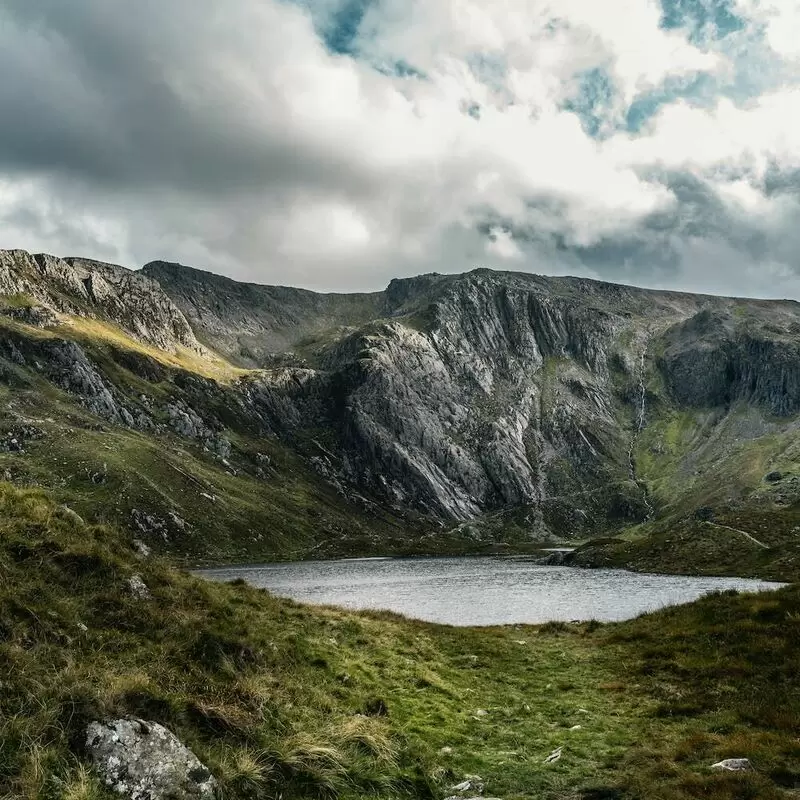
1. Castle Hill
A visit to Castle Hill in Wales is a wonderful opportunity to travel back in time, as it houses a rich piece of history that dates back to the Iron Age. The breathtaking panorama that stretches from the hill to the Bristol Channel will amaze you. Explore the ruins of the Norman castle or explore the idyllic woodland with its diverse flora. South of Castle Hill, the Llanelli Wetland Centre is worth a detour: colorful flamingos, exotic butterflies and tranquil nature walks await you!
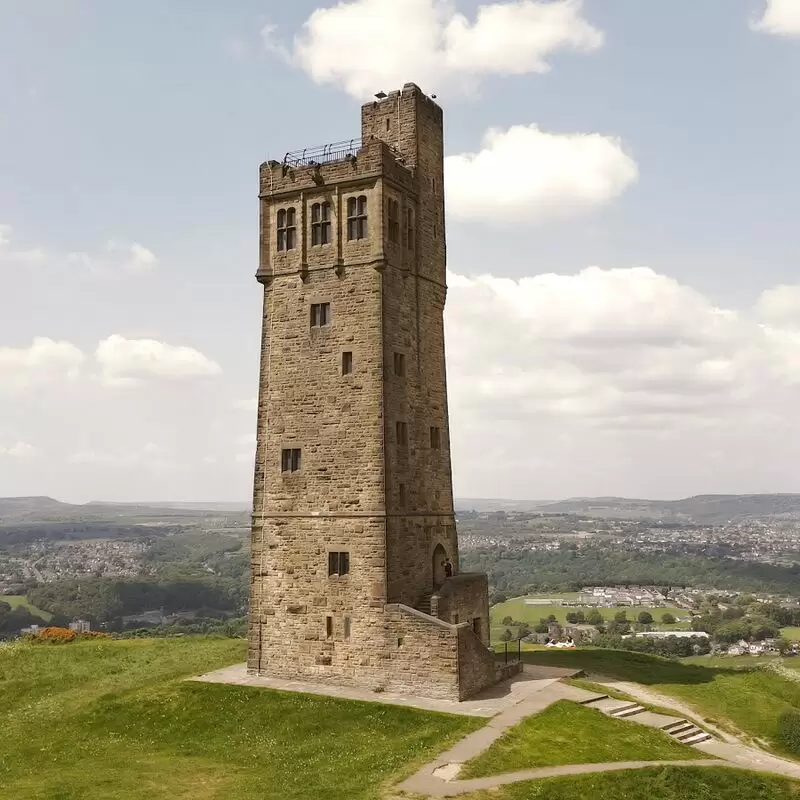 Castle Hill
Castle Hill
Castle Hill Side, Huddersfield
Monday - Sunday: Open 24 hours

Castle Hill Side, Huddersfield
2. National Coal Mining Museum for England
Delve deep into the fascinating history of mining at the National Coal Mining Museum near Wakefield in England. This experience offers an authentic insight into the harsh reality of mining, narrated by former miners. Feel the cool atmosphere underground, descend 140 meters in a cage and experience a captivating guided tour underground. What's more, it's just a stone's throw to other fascinating attractions, including the neighboring Yorkshire Sculpture Park and the Hepworth Gallery in Wakefield, for an added cultural excursion.
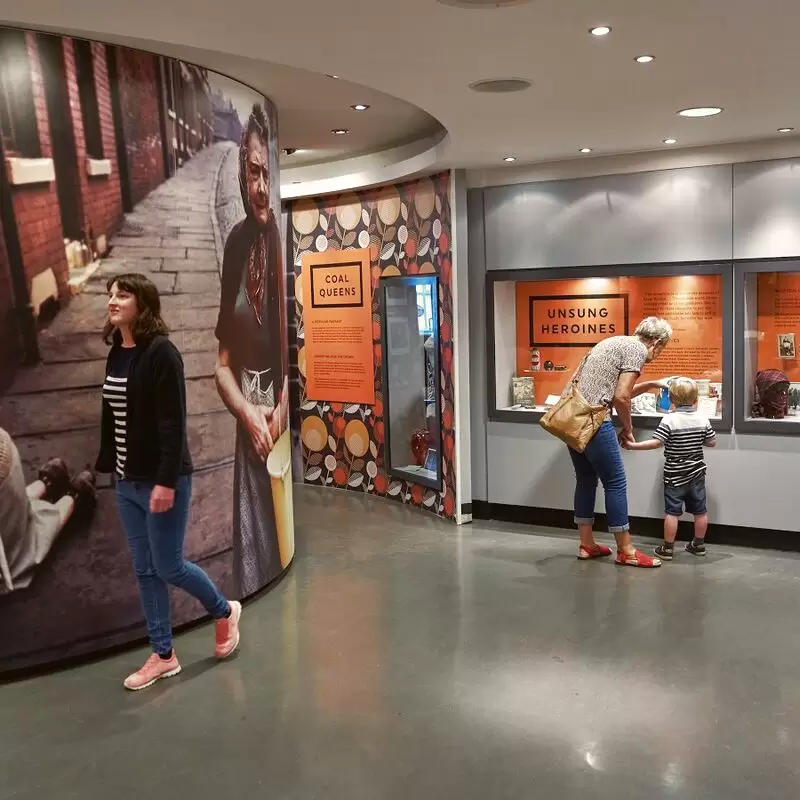 National Coal Mining Museum for England
National Coal Mining Museum for England
Caphouse Colliery, New Road, Overton, Wakefield
Monday - Tuesday: Closed
Wednesday - Sunday: 10:00 AM – 5:00 PM

Caphouse Colliery, New Road, Overton, Wakefield
Wednesday - Sunday: 10:00 AM – 5:00 PM
3. Chatsworth Park
Chatsworth Park is not in Wales, but in Derbyshire, England. However, if you are traveling in Wales, you can visit the equally fascinating "Powis Castle and Garden" in Welshpool. This medieval castle rises dramatically above the world-class garden, which boasts a fascinating array of flowers and historic splendor. Powis houses a remarkable collection of valuable paintings, sculptures, furniture and tapestries. A walk through Deer Park is a must! Also, take a side trip to Lake Vyrnwy, an enticing man-made lake. Enjoy your journey through history!
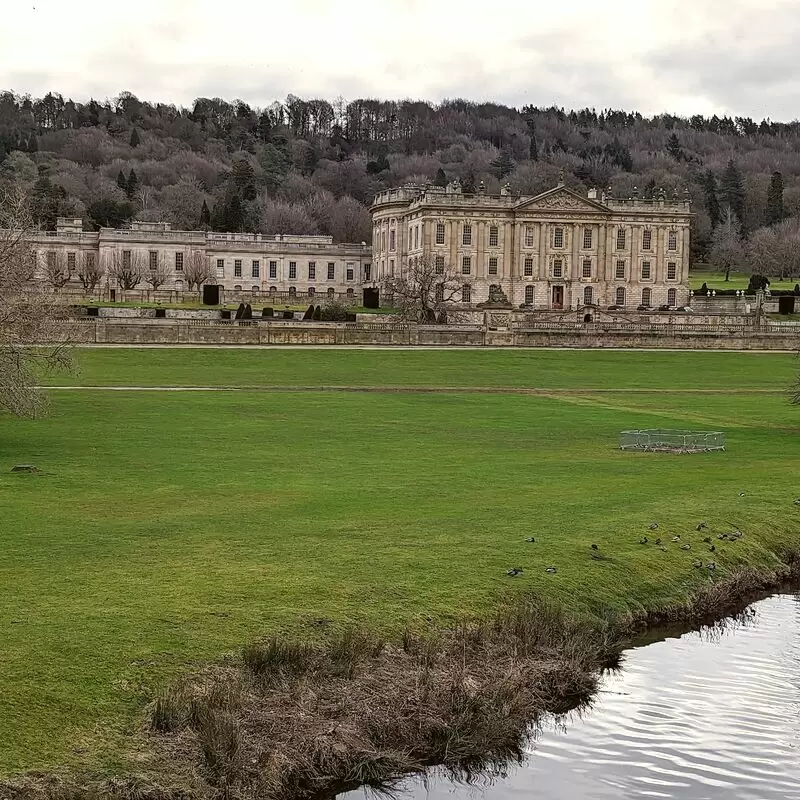 Chatsworth Park
Chatsworth Park
Bakewell
Monday - Sunday: 10:30 AM – 5:00 PM

Bakewell
4. Boultham Park
Boultham Park is a tranquil oasis in the heart of the bustling city. Offering lush greenery, tranquil lake views and vibrant wildlife, it embodies quintessential Welsh charisma. The chapel in the park is an icon of historic architecture that combines history and beauty. Don't miss the picturesque Rose Garden, an undiscovered gem that glows with color. The fascinating Hartsholme Country Park is just a stone's throw away and is perfect for an extended day of exploring.
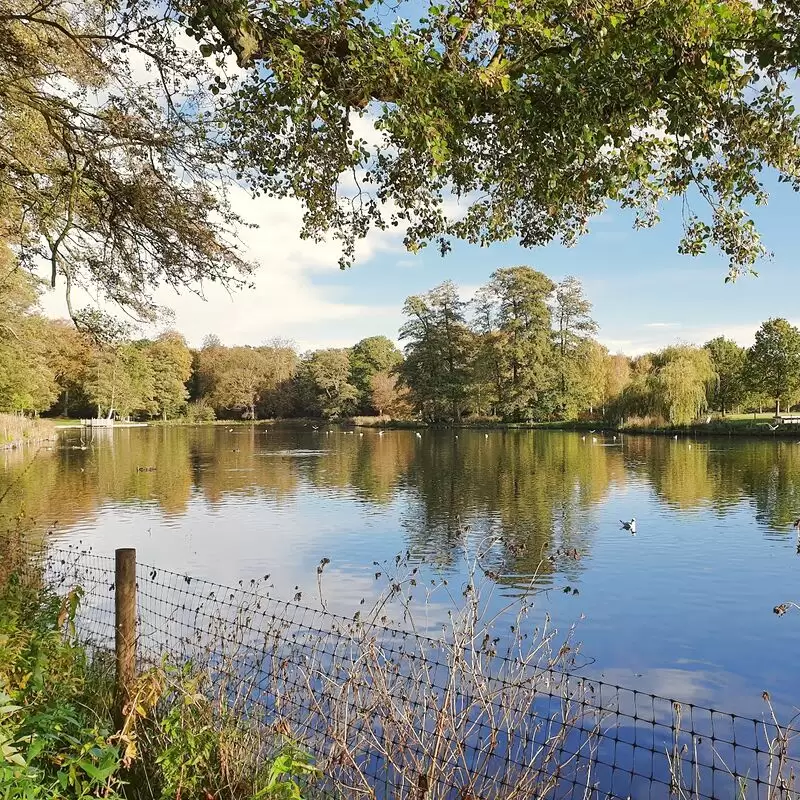 Boultham Park
Boultham Park
55 Hall Drive, Lincoln
Monday - Sunday: 9:00 AM – 3:00 PM

55 Hall Drive, Lincoln
5. Rotherham Minster
Travel to "Rotherham Minster" and experience an unforgettable journey into history. This stunning landmark is a masterpiece of Gothic architecture with Norman and medieval roots and offers a tangible connection to Wales' fascinating past. Discover hidden treasures like the choir's beautiful stained glass windows and intricate wood carvings. The nearby Clifton Park Museum, which showcases the social history of the region, is not to be missed for a comprehensive cultural excursion.
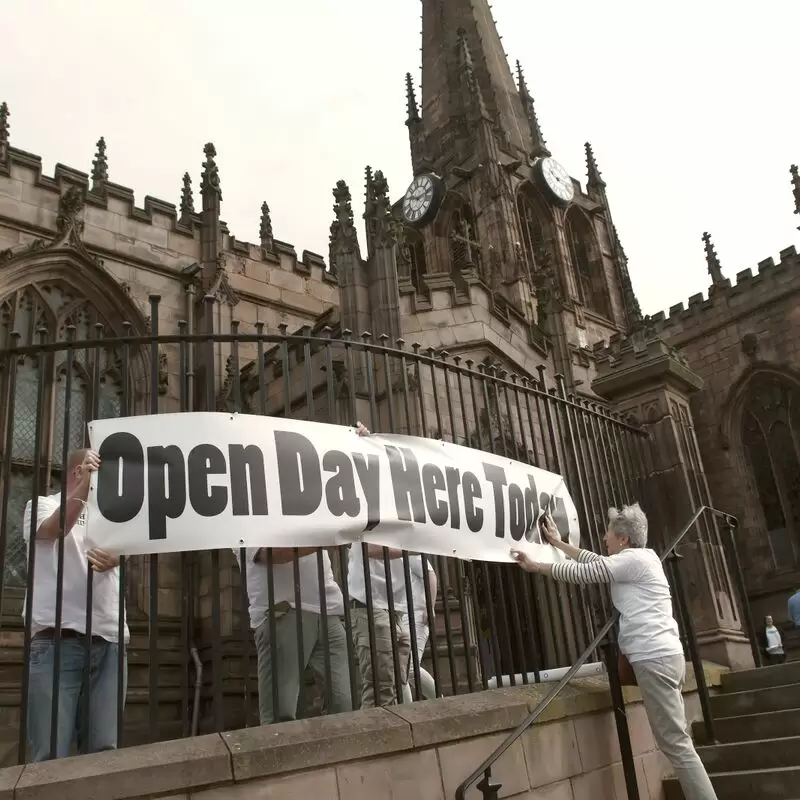 Rotherham Minster
Rotherham Minster
Church Street, Rotherham
Monday - Saturday: Closed
Tuesday - Thursday: 10:00 AM – 2:00 PM
Wednesday: 11:00 AM – 2:00 PM
Sunday: 9:00 AM – 12:00 PM

Church Street, Rotherham
Tuesday - Thursday: 10:00 AM – 2:00 PM
Wednesday: 11:00 AM – 2:00 PM
Sunday: 9:00 AM – 12:00 PM
Best Time to Visit Wales
The best time to visit Wales is spring (April to June) and early autumn (September to October), when the weather is mild, nature is at its peak and tourist crowds are low. This time is ideal for outdoor activities and sightseeing. However, for cultural festivals, consider visiting in July and August.
Annual Weather in Wales
January
Jan
35 / 47 °F
2 / 9 °C
1
7
42
February
Feb
36 / 51 °F
2 / 10 °C
1
5
34
March
Mar
37 / 55 °F
3 / 13 °C
1
6
41
April
Apr
39 / 62 °F
4 / 17 °C
0
5
43
May
May
44 / 64 °F
7 / 18 °C
1
6
39
June
Jun
50 / 68 °F
10 / 20 °C
1
6
39
July
Jul
54 / 75 °F
12 / 24 °C
1
6
41
August
Aug
55 / 76 °F
13 / 24 °C
1
6
42
September
Sep
51 / 68 °F
11 / 20 °C
1
4
44
October
Oct
47 / 61 °F
8 / 16 °C
1
6
37
November
Nov
41 / 54 °F
5 / 12 °C
1
6
36
December
Dec
37 / 52 °F
3 / 11 °C
1
7
44
Questions & Answers
What is the official language in Wales?
Wales has two official languages: Welsh and English. Although both languages are used, the extent of their use varies across the region. In most parts of Wales, English is the predominant language. However, Welsh, one of the oldest languages in Europe, is still widely spoken, especially in the northern and western parts of the country. The Welsh government is actively promoting and preserving the Welsh language to ensure its continuation for future generations.
Can I get around easily using English?
In any case, you will have no difficulty getting around in Wales in English. Although Welsh is widely spoken, all residents also speak English. In addition, all signs, menus and other public information are usually available in both languages. Whether you are asking for directions, ordering a meal, or buying a ticket, you can confidently do so in English.
How do I pronounce Welsh place names?
Pronouncing Welsh place names can be challenging due to the unique sounds and spellings. Key sounds include "ll" pronounced almost like a hissing sound, "ch" as in brook, "dd" is pronounced like "th", "w" often sounds like "oo", "f" is pronounced like "v", and "ff" is pronounced like "f". For example, Llandudno is pronounced "Khlant-id-no" and Caernarfon is pronounced "Karen-von". Practice will make it easier over time. Don't worry if you mispronounce it, the locals are used to it!
What's the traditional food like in Wales?
Traditional Welsh cuisine combines simple and hearty ingredients. It is known for dishes such as Welsh Cawl, a comforting stew of lamb and root vegetables, and Welsh Rarebit, a hearty dish of melted cheese on toast. Popular desserts include Bara Brith, a spiced fruit bread, and Welsh Cakes, small dough cakes baked on a griddle. Locally made cheeses, seaweed known as "laverbread," and fresh seafood are also staples in Wales. These foods reflect the Welsh pastoral and coastal landscapes.
How can I use public transport there?
In Wales, public transport is well organized and efficient. The main means of transport are buses, trains and streetcars, which are available in most cities. Train services are mainly operated by Transport for Wales. Buses are plentiful and on many different routes. You can also make contactless payments in most places. If you're visiting Cardiff, you can also use the city's own bike rental system, nextbike. However, in rural areas, there may be less frequent services. It is recommended that you plan your trip in advance on the Transport for Wales website or app.
What's the driving rule in Wales?
In Wales, as in the rest of the UK, you must drive on the left-hand side of the road. All vehicle occupants must wear seat belts at all times, and talking on a cell phone while driving is strictly prohibited. Speed limits vary by road type: 48 km/h (30 mph) in built-up areas, 97 km/h (60 mph) on single-lane roads, and 112 km/h (70 mph) on dual-lane roads and freeways. Remember to always carry a valid driver's license, identification and your insurance documents while driving.
Is it safe to travel in Wales?
Yes, it is generally very safe to travel in Wales. As everywhere, it is important to take the usual precautions, such as locking car and hotel doors and not leaving valuables unattended. The crime rate is relatively low and people are generally friendly and helpful. Medical care is also excellent. Both urban and rural areas are safe to explore, but extra care should be taken on rural roads, especially in bad weather.
May I drink tap water in Wales?
Yes, the tap water in Wales, United Kingdom, is absolutely safe to drink. The country maintains strict standards for its public water supply. Some visitors even praise the taste of Welsh tap water, as much of the water comes from the region's reservoirs and natural resources. However, the taste can vary depending on where you are in Wales due to different treatment processes.
Can I use my credit card in most places?
Yes, you can use your credit cards in Wales as most hotels, restaurants and stores accept all major credit cards. However, it is always advisable to have some cash with you as small retailers or pubs in the countryside may not accept cards. There are also plenty of ATMs if you need cash. Inform your bank in advance of your trip to avoid unexpected blocking of your card.
What's the currency of Wales?
The official currency in Wales is the British Pound Sterling (GBP). This is the same currency used throughout the United Kingdom, including Scotland, England and Northern Ireland. The pound is divided into 100 pence, and there are coins worth 1p, 2p, 5p, 10p, 20p, 50p, £1 and £2, as well as banknotes worth £5, £10, £20 and £50.
What traditional clothing is worn in Wales?
Traditional Welsh dress is most recognizable in the clothing worn by women, which typically includes a petticoat and a coat, both made of flannel. On their heads, they wear a unique tall hat that resembles a stovepipe hat, often with a lace hood underneath. The men, on the other hand, traditionally wear simple trousers, a vest and a shirt, usually made of wool. However, this clothing is no longer commonplace and is worn mainly on special occasions and national celebrations.
How do I respect local customs and traditions?
When exploring Wales, it is important to respect local customs and traditions. The Welsh appreciate it if you try to speak a few words in Welsh, although English is widely spoken. Always ask permission before photographing people or specific landmarks. Respect the peace and cleanliness of the countryside by not leaving litter. Be considerate of the locals by not being too loud or disruptive, especially in rural areas or at night.
Are there specific dress codes I should follow in Wales?
There is no specific dress code for visitors in Wales. Instead, dress in Wales is quite casual and similar to the rest of the UK. However, the weather can be quite changeable, so multiple layers and waterproof clothing are a good idea. If you plan to visit religious sites or institutions, modest clothing is usually encouraged. Always remember to dress comfortably and appropriately for the various activities or events you plan to attend.
What wildlife might I encounter in Wales?
Wales is home to a wide range of wildlife. Traveling through the varied landscapes, you can see the famous red kite in the air, while on the coast you can watch grey seals or dolphins splashing in the surf. In the dense forests you can meet badgers, foxes and the rare polecat. The sky is filled with various species of birds, from puffins to peregrine falcons, and the rivers are teeming with otters and various species of fish. It is a true paradise for wildlife!
What is the Welsh national sport?
Rugby union is the national sport of Wales. The Welsh have an incredible passion for this sport, which has had a decisive impact on the national identity. The Welsh national team is internationally renowned, has a long history and participates in major tournaments such as the Six Nations Championship. People flock to the Millennium Stadium in Cardiff, the legendary venue for the sport, reflecting the country's deep-rooted love and fanatical enthusiasm for rugby.
Is it customary to tip in Wales?
Tipping is not usually expected in Wales, similar to the rest of the UK, but is quite welcome. Service charges are often included in restaurant bills, but when this is not the case, a tip of around 10% is usually given for good service. For cab rides, rounding up to the nearest pound is generally acceptable. It should be noted that the tipping culture may vary slightly by region and locale. Always remember: tipping is a matter of discretion.
What's the emergency number in Wales?
In Wales, the emergency number is "999". This important number will connect you with the police, fire and medical services in an emergency. Always call 999 if it is an emergency, for example, if someone is seriously ill or injured, or if a crime is in progress. Non-emergency situations can be reported to the police by calling "101". It is important to use these numbers only when necessary to keep them open for real emergencies.
Is Wales expensive to visit?
The cost of visiting Wales can vary significantly depending on your travel preferences. Among the most important factors are the type of accommodation you choose, the expenses for food and the sights you visit. In general, prices can be described as moderate. Budget travelers can get by with less, especially if they self-cater and use public transportation, while luxury travelers will spend more on upscale hotels and restaurants. Attractions such as the impressive castles often have affordable entrance fees.
How do I get a local SIM card?
Getting a local SIM card in Wales is easy. Many supermarkets, post offices and newsagents sell them. There are also specialized cell phone stores where you can buy a SIM card. You can buy a prepaid SIM card without a contract or take out a SIM contract if you are staying in Wales for a longer period of time. All you need is a compatible unlocked cell phone. These SIM cards can be topped up either online or in local stores.
What's the general etiquette in Wales?
The Welsh are known for their warmth and friendliness. Respect for the rich Welsh culture, its language and traditions is appreciated. It is also common to greet each other with a simple "hello" or "shwmae" in Welsh. Punctuality is important at business and social meetings. Invitations to local events should be accepted politely, and it is customary to thank your host with a small gift. Tipping is common in restaurants, but not obligatory. Finally, you should behave properly in the queue and wait patiently for your turn.
What should I know about Welsh history?
Wales, a major part of Great Britain, has a rich history marked by Celtic roots, Roman invasions and Viking raids. It is known for its courageous resistance to English conquest in the Middle Ages, symbolized by national heroes such as brave Owen and Llywelyn the Great. After industrialization, coal mining became a central facet of Welsh history. Wales is also proud of its language, Welsh, which continues to thrive today despite all the challenges.
Are there any health or vaccination recommendations before coming?
There are no specific vaccinations required for travelers to Wales, United Kingdom. However, it is always recommended to brush up on routine vaccinations such as MMR (measles, mumps and rubella), diphtheria-tetanus-pertussis and the annual flu shot. Travelers should also routinely get vaccinated against chickenpox, polio and the annual flu shot. However, always contact your doctor or a travel clinic for personalized advice.
Where can I find authentic Welsh music or festivals?
Wales, the land of song, offers numerous music festivals and events where you can enjoy Welsh music. One of these events is the National Eisteddfod, the largest and oldest celebration of Welsh culture and music. Festival Number 6 in Portmeirion also offers a wide range of Welsh folk, indie and pop music. The coastal town of Aberystwyth hosts the annual International Folk Festival, and Cardiff Bay hosts the Welsh Proms.
What type of power adapter do I need for Wales?
In Wales, the standard voltage is 230 V and the frequency is 50 Hz. The sockets, type G, are unique to the UK and have three rectangular pins. If your device does not fit into the type G socket, you will need a travel adapter. Please note that travel adapters only adapt the shape of the outlet, but do not convert the voltage or frequency. If your device is not designed for 230V, you may need to purchase a voltage converter.
Can I camp anywhere in Wales?
No, you can't camp just anywhere in Wales. Even though the region with its natural beauty is ideal for camping, you have to know that wild camping without the landowner's permission is actually illegal. However, there are many designated campsites with various facilities and rules. Always make sure that you follow the guidelines to protect the environment and local communities. Responsible camping is recommended for the best experience.
How friendly are the people in Wales?
The people of Wales are generally known for their warm, outgoing and friendly nature. There is a palpable sense of community in both rural and urban areas. The Welsh are proud of their rich culture and history and are happy to share their knowledge, often going out of their way to help tourists explore their beautiful country. They are polite, good-natured and always up for a friendly chat, creating a wonderful blend of coziness and comfort for visitors.
How is the nightlife in Wales?
Wales offers a diverse nightlife with something for everyone. Cardiff, the capital, boasts a vibrant scene with an abundance of pubs, clubs and live music venues. Smaller cities like Swansea and Newport also offer a lively nightlife with its own charm. From traditional Welsh pubs to stylish cocktail bars and student-friendly clubs, Wales has something for everyone. In addition, Wales is also known for its theater and concert scene, which offers cultural alternatives to nightlife.
What's a popular non-touristy thing to do in Wales?
A unique and non-touristy activity to do in Wales is to explore the local food scene. A visit to the quaint town of Hay-on-Wye, known for its charming bookstores and local cheese markets, is especially recommended. Here you can sample traditional Welsh dishes such as Welsh Rarebit and Laverbread, visit farmers markets to buy locally produced food, or even take part in a cooking workshop to learn how to prepare a traditional Welsh dish.
How far in advance should I book my travel itinerary?
To ensure availability and the best prices, you should book your trip to Wales at least three to six months in advance. This will give you enough time to plan and reserve accommodations, attractions and transportation. However, if you plan to travel during peak travel seasons, such as summer, or during major events, you should book even earlier. Last minute bookings are possible, but may limit your options.
What's the best way for internal travel within Wales?
Travel within Wales is best done by car for maximum flexibility and to explore the rural areas. The country has an extensive network of well-maintained roads connecting all major cities. For those who prefer public transportation, Wales has an efficient train system with scenic routes, especially along the coast. There is also an extensive bus network that covers large parts of the country, making it accessible to all.
Feedback
I hope you found this article informative and helpful. I'm eager to improve the content and make it even more valuable for you. If you have any feedback or suggestions, I would love to hear from you.
Do you have any tips or hidden gems that you think should be added to the list? Are there any areas that you feel could use more explanation or clarification?
Your input is greatly appreciated and will help us to continue providing high-quality content that meets your needs and interests. Please feel free to share your thoughts.
What is the official language in Wales?
Wales has two official languages: Welsh and English. Although both languages are used, the extent of their use varies across the region. In most parts of Wales, English is the predominant language. However, Welsh, one of the oldest languages in Europe, is still widely spoken, especially in the northern and western parts of the country. The Welsh government is actively promoting and preserving the Welsh language to ensure its continuation for future generations.
Can I get around easily using English?
In any case, you will have no difficulty getting around in Wales in English. Although Welsh is widely spoken, all residents also speak English. In addition, all signs, menus and other public information are usually available in both languages. Whether you are asking for directions, ordering a meal, or buying a ticket, you can confidently do so in English.
How do I pronounce Welsh place names?
Pronouncing Welsh place names can be challenging due to the unique sounds and spellings. Key sounds include "ll" pronounced almost like a hissing sound, "ch" as in brook, "dd" is pronounced like "th", "w" often sounds like "oo", "f" is pronounced like "v", and "ff" is pronounced like "f". For example, Llandudno is pronounced "Khlant-id-no" and Caernarfon is pronounced "Karen-von". Practice will make it easier over time. Don't worry if you mispronounce it, the locals are used to it!
What's the traditional food like in Wales?
Traditional Welsh cuisine combines simple and hearty ingredients. It is known for dishes such as Welsh Cawl, a comforting stew of lamb and root vegetables, and Welsh Rarebit, a hearty dish of melted cheese on toast. Popular desserts include Bara Brith, a spiced fruit bread, and Welsh Cakes, small dough cakes baked on a griddle. Locally made cheeses, seaweed known as "laverbread," and fresh seafood are also staples in Wales. These foods reflect the Welsh pastoral and coastal landscapes.
How can I use public transport there?
In Wales, public transport is well organized and efficient. The main means of transport are buses, trains and streetcars, which are available in most cities. Train services are mainly operated by Transport for Wales. Buses are plentiful and on many different routes. You can also make contactless payments in most places. If you're visiting Cardiff, you can also use the city's own bike rental system, nextbike. However, in rural areas, there may be less frequent services. It is recommended that you plan your trip in advance on the Transport for Wales website or app.
What's the driving rule in Wales?
In Wales, as in the rest of the UK, you must drive on the left-hand side of the road. All vehicle occupants must wear seat belts at all times, and talking on a cell phone while driving is strictly prohibited. Speed limits vary by road type: 48 km/h (30 mph) in built-up areas, 97 km/h (60 mph) on single-lane roads, and 112 km/h (70 mph) on dual-lane roads and freeways. Remember to always carry a valid driver's license, identification and your insurance documents while driving.
Is it safe to travel in Wales?
Yes, it is generally very safe to travel in Wales. As everywhere, it is important to take the usual precautions, such as locking car and hotel doors and not leaving valuables unattended. The crime rate is relatively low and people are generally friendly and helpful. Medical care is also excellent. Both urban and rural areas are safe to explore, but extra care should be taken on rural roads, especially in bad weather.
May I drink tap water in Wales?
Yes, the tap water in Wales, United Kingdom, is absolutely safe to drink. The country maintains strict standards for its public water supply. Some visitors even praise the taste of Welsh tap water, as much of the water comes from the region's reservoirs and natural resources. However, the taste can vary depending on where you are in Wales due to different treatment processes.
Can I use my credit card in most places?
Yes, you can use your credit cards in Wales as most hotels, restaurants and stores accept all major credit cards. However, it is always advisable to have some cash with you as small retailers or pubs in the countryside may not accept cards. There are also plenty of ATMs if you need cash. Inform your bank in advance of your trip to avoid unexpected blocking of your card.
What's the currency of Wales?
The official currency in Wales is the British Pound Sterling (GBP). This is the same currency used throughout the United Kingdom, including Scotland, England and Northern Ireland. The pound is divided into 100 pence, and there are coins worth 1p, 2p, 5p, 10p, 20p, 50p, £1 and £2, as well as banknotes worth £5, £10, £20 and £50.
What traditional clothing is worn in Wales?
Traditional Welsh dress is most recognizable in the clothing worn by women, which typically includes a petticoat and a coat, both made of flannel. On their heads, they wear a unique tall hat that resembles a stovepipe hat, often with a lace hood underneath. The men, on the other hand, traditionally wear simple trousers, a vest and a shirt, usually made of wool. However, this clothing is no longer commonplace and is worn mainly on special occasions and national celebrations.
How do I respect local customs and traditions?
When exploring Wales, it is important to respect local customs and traditions. The Welsh appreciate it if you try to speak a few words in Welsh, although English is widely spoken. Always ask permission before photographing people or specific landmarks. Respect the peace and cleanliness of the countryside by not leaving litter. Be considerate of the locals by not being too loud or disruptive, especially in rural areas or at night.
Are there specific dress codes I should follow in Wales?
There is no specific dress code for visitors in Wales. Instead, dress in Wales is quite casual and similar to the rest of the UK. However, the weather can be quite changeable, so multiple layers and waterproof clothing are a good idea. If you plan to visit religious sites or institutions, modest clothing is usually encouraged. Always remember to dress comfortably and appropriately for the various activities or events you plan to attend.
What wildlife might I encounter in Wales?
Wales is home to a wide range of wildlife. Traveling through the varied landscapes, you can see the famous red kite in the air, while on the coast you can watch grey seals or dolphins splashing in the surf. In the dense forests you can meet badgers, foxes and the rare polecat. The sky is filled with various species of birds, from puffins to peregrine falcons, and the rivers are teeming with otters and various species of fish. It is a true paradise for wildlife!
What is the Welsh national sport?
Rugby union is the national sport of Wales. The Welsh have an incredible passion for this sport, which has had a decisive impact on the national identity. The Welsh national team is internationally renowned, has a long history and participates in major tournaments such as the Six Nations Championship. People flock to the Millennium Stadium in Cardiff, the legendary venue for the sport, reflecting the country's deep-rooted love and fanatical enthusiasm for rugby.
Is it customary to tip in Wales?
Tipping is not usually expected in Wales, similar to the rest of the UK, but is quite welcome. Service charges are often included in restaurant bills, but when this is not the case, a tip of around 10% is usually given for good service. For cab rides, rounding up to the nearest pound is generally acceptable. It should be noted that the tipping culture may vary slightly by region and locale. Always remember: tipping is a matter of discretion.
What's the emergency number in Wales?
In Wales, the emergency number is "999". This important number will connect you with the police, fire and medical services in an emergency. Always call 999 if it is an emergency, for example, if someone is seriously ill or injured, or if a crime is in progress. Non-emergency situations can be reported to the police by calling "101". It is important to use these numbers only when necessary to keep them open for real emergencies.
Is Wales expensive to visit?
The cost of visiting Wales can vary significantly depending on your travel preferences. Among the most important factors are the type of accommodation you choose, the expenses for food and the sights you visit. In general, prices can be described as moderate. Budget travelers can get by with less, especially if they self-cater and use public transportation, while luxury travelers will spend more on upscale hotels and restaurants. Attractions such as the impressive castles often have affordable entrance fees.
How do I get a local SIM card?
Getting a local SIM card in Wales is easy. Many supermarkets, post offices and newsagents sell them. There are also specialized cell phone stores where you can buy a SIM card. You can buy a prepaid SIM card without a contract or take out a SIM contract if you are staying in Wales for a longer period of time. All you need is a compatible unlocked cell phone. These SIM cards can be topped up either online or in local stores.
What's the general etiquette in Wales?
The Welsh are known for their warmth and friendliness. Respect for the rich Welsh culture, its language and traditions is appreciated. It is also common to greet each other with a simple "hello" or "shwmae" in Welsh. Punctuality is important at business and social meetings. Invitations to local events should be accepted politely, and it is customary to thank your host with a small gift. Tipping is common in restaurants, but not obligatory. Finally, you should behave properly in the queue and wait patiently for your turn.
What should I know about Welsh history?
Wales, a major part of Great Britain, has a rich history marked by Celtic roots, Roman invasions and Viking raids. It is known for its courageous resistance to English conquest in the Middle Ages, symbolized by national heroes such as brave Owen and Llywelyn the Great. After industrialization, coal mining became a central facet of Welsh history. Wales is also proud of its language, Welsh, which continues to thrive today despite all the challenges.
Are there any health or vaccination recommendations before coming?
There are no specific vaccinations required for travelers to Wales, United Kingdom. However, it is always recommended to brush up on routine vaccinations such as MMR (measles, mumps and rubella), diphtheria-tetanus-pertussis and the annual flu shot. Travelers should also routinely get vaccinated against chickenpox, polio and the annual flu shot. However, always contact your doctor or a travel clinic for personalized advice.
Where can I find authentic Welsh music or festivals?
Wales, the land of song, offers numerous music festivals and events where you can enjoy Welsh music. One of these events is the National Eisteddfod, the largest and oldest celebration of Welsh culture and music. Festival Number 6 in Portmeirion also offers a wide range of Welsh folk, indie and pop music. The coastal town of Aberystwyth hosts the annual International Folk Festival, and Cardiff Bay hosts the Welsh Proms.
What type of power adapter do I need for Wales?
In Wales, the standard voltage is 230 V and the frequency is 50 Hz. The sockets, type G, are unique to the UK and have three rectangular pins. If your device does not fit into the type G socket, you will need a travel adapter. Please note that travel adapters only adapt the shape of the outlet, but do not convert the voltage or frequency. If your device is not designed for 230V, you may need to purchase a voltage converter.
Can I camp anywhere in Wales?
No, you can't camp just anywhere in Wales. Even though the region with its natural beauty is ideal for camping, you have to know that wild camping without the landowner's permission is actually illegal. However, there are many designated campsites with various facilities and rules. Always make sure that you follow the guidelines to protect the environment and local communities. Responsible camping is recommended for the best experience.
How friendly are the people in Wales?
The people of Wales are generally known for their warm, outgoing and friendly nature. There is a palpable sense of community in both rural and urban areas. The Welsh are proud of their rich culture and history and are happy to share their knowledge, often going out of their way to help tourists explore their beautiful country. They are polite, good-natured and always up for a friendly chat, creating a wonderful blend of coziness and comfort for visitors.
How is the nightlife in Wales?
Wales offers a diverse nightlife with something for everyone. Cardiff, the capital, boasts a vibrant scene with an abundance of pubs, clubs and live music venues. Smaller cities like Swansea and Newport also offer a lively nightlife with its own charm. From traditional Welsh pubs to stylish cocktail bars and student-friendly clubs, Wales has something for everyone. In addition, Wales is also known for its theater and concert scene, which offers cultural alternatives to nightlife.
What's a popular non-touristy thing to do in Wales?
A unique and non-touristy activity to do in Wales is to explore the local food scene. A visit to the quaint town of Hay-on-Wye, known for its charming bookstores and local cheese markets, is especially recommended. Here you can sample traditional Welsh dishes such as Welsh Rarebit and Laverbread, visit farmers markets to buy locally produced food, or even take part in a cooking workshop to learn how to prepare a traditional Welsh dish.
How far in advance should I book my travel itinerary?
To ensure availability and the best prices, you should book your trip to Wales at least three to six months in advance. This will give you enough time to plan and reserve accommodations, attractions and transportation. However, if you plan to travel during peak travel seasons, such as summer, or during major events, you should book even earlier. Last minute bookings are possible, but may limit your options.
What's the best way for internal travel within Wales?
Travel within Wales is best done by car for maximum flexibility and to explore the rural areas. The country has an extensive network of well-maintained roads connecting all major cities. For those who prefer public transportation, Wales has an efficient train system with scenic routes, especially along the coast. There is also an extensive bus network that covers large parts of the country, making it accessible to all.
Feedback
I hope you found this article informative and helpful. I'm eager to improve the content and make it even more valuable for you. If you have any feedback or suggestions, I would love to hear from you.
Do you have any tips or hidden gems that you think should be added to the list? Are there any areas that you feel could use more explanation or clarification?
Your input is greatly appreciated and will help us to continue providing high-quality content that meets your needs and interests. Please feel free to share your thoughts.
I hope you found this article informative and helpful. I'm eager to improve the content and make it even more valuable for you. If you have any feedback or suggestions, I would love to hear from you.
Do you have any tips or hidden gems that you think should be added to the list? Are there any areas that you feel could use more explanation or clarification?
Your input is greatly appreciated and will help us to continue providing high-quality content that meets your needs and interests. Please feel free to share your thoughts.

